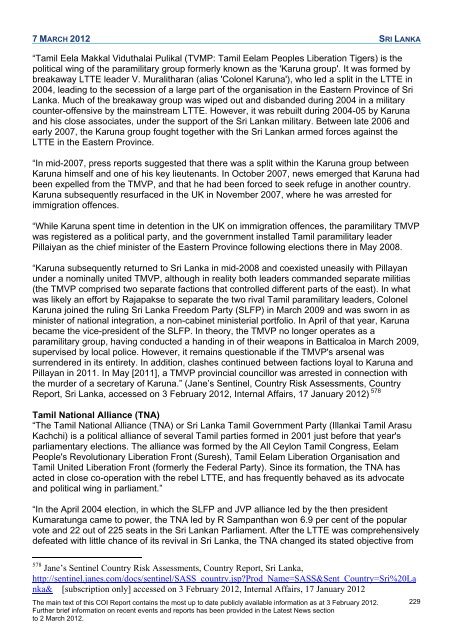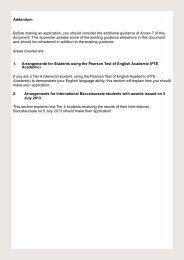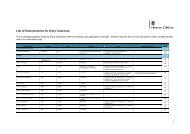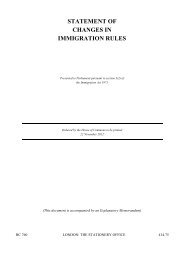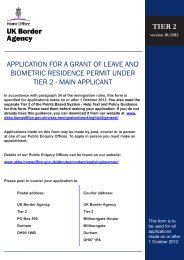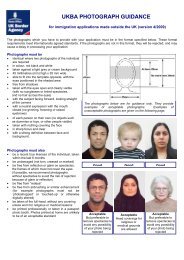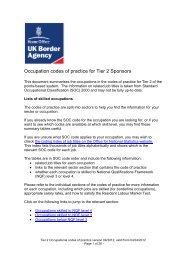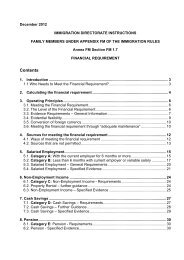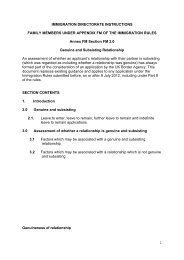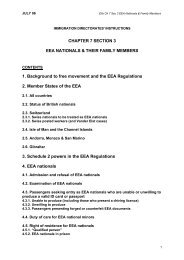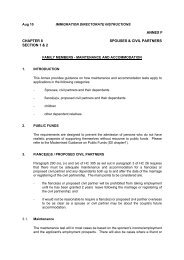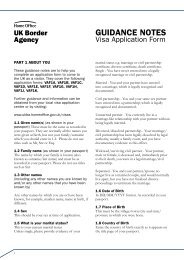COI Report March 2012 - UK Border Agency - Home Office
COI Report March 2012 - UK Border Agency - Home Office
COI Report March 2012 - UK Border Agency - Home Office
Create successful ePaper yourself
Turn your PDF publications into a flip-book with our unique Google optimized e-Paper software.
7 MARCH <strong>2012</strong> SRI LANKA<br />
―Tamil Eela Makkal Viduthalai Pulikal (TVMP: Tamil Eelam Peoples Liberation Tigers) is the<br />
political wing of the paramilitary group formerly known as the 'Karuna group'. It was formed by<br />
breakaway LTTE leader V. Muralitharan (alias 'Colonel Karuna'), who led a split in the LTTE in<br />
2004, leading to the secession of a large part of the organisation in the Eastern Province of Sri<br />
Lanka. Much of the breakaway group was wiped out and disbanded during 2004 in a military<br />
counter-offensive by the mainstream LTTE. However, it was rebuilt during 2004-05 by Karuna<br />
and his close associates, under the support of the Sri Lankan military. Between late 2006 and<br />
early 2007, the Karuna group fought together with the Sri Lankan armed forces against the<br />
LTTE in the Eastern Province.<br />
―In mid-2007, press reports suggested that there was a split within the Karuna group between<br />
Karuna himself and one of his key lieutenants. In October 2007, news emerged that Karuna had<br />
been expelled from the TMVP, and that he had been forced to seek refuge in another country.<br />
Karuna subsequently resurfaced in the <strong>UK</strong> in November 2007, where he was arrested for<br />
immigration offences.<br />
―While Karuna spent time in detention in the <strong>UK</strong> on immigration offences, the paramilitary TMVP<br />
was registered as a political party, and the government installed Tamil paramilitary leader<br />
Pillaiyan as the chief minister of the Eastern Province following elections there in May 2008.<br />
―Karuna subsequently returned to Sri Lanka in mid-2008 and coexisted uneasily with Pillayan<br />
under a nominally united TMVP, although in reality both leaders commanded separate militias<br />
(the TMVP comprised two separate factions that controlled different parts of the east). In what<br />
was likely an effort by Rajapakse to separate the two rival Tamil paramilitary leaders, Colonel<br />
Karuna joined the ruling Sri Lanka Freedom Party (SLFP) in <strong>March</strong> 2009 and was sworn in as<br />
minister of national integration, a non-cabinet ministerial portfolio. In April of that year, Karuna<br />
became the vice-president of the SLFP. In theory, the TMVP no longer operates as a<br />
paramilitary group, having conducted a handing in of their weapons in Batticaloa in <strong>March</strong> 2009,<br />
supervised by local police. However, it remains questionable if the TMVP's arsenal was<br />
surrendered in its entirety. In addition, clashes continued between factions loyal to Karuna and<br />
Pillayan in 2011. In May [2011], a TMVP provincial councillor was arrested in connection with<br />
the murder of a secretary of Karuna.‖ (Jane‘s Sentinel, Country Risk Assessments, Country<br />
<strong>Report</strong>, Sri Lanka, accessed on 3 February <strong>2012</strong>, Internal Affairs, 17 January <strong>2012</strong>) 578<br />
Tamil National Alliance (TNA)<br />
―The Tamil National Alliance (TNA) or Sri Lanka Tamil Government Party (Illankai Tamil Arasu<br />
Kachchi) is a political alliance of several Tamil parties formed in 2001 just before that year's<br />
parliamentary elections. The alliance was formed by the All Ceylon Tamil Congress, Eelam<br />
People's Revolutionary Liberation Front (Suresh), Tamil Eelam Liberation Organisation and<br />
Tamil United Liberation Front (formerly the Federal Party). Since its formation, the TNA has<br />
acted in close co-operation with the rebel LTTE, and has frequently behaved as its advocate<br />
and political wing in parliament.‖<br />
―In the April 2004 election, in which the SLFP and JVP alliance led by the then president<br />
Kumaratunga came to power, the TNA led by R Sampanthan won 6.9 per cent of the popular<br />
vote and 22 out of 225 seats in the Sri Lankan Parliament. After the LTTE was comprehensively<br />
defeated with little chance of its revival in Sri Lanka, the TNA changed its stated objective from<br />
578 Jane’s Sentinel Country Risk Assessments, Country <strong>Report</strong>, Sri Lanka,<br />
http://sentinel.janes.com/docs/sentinel/SASS_country.jsp?Prod_Name=SASS&Sent_Country=Sri%20La<br />
nka& [subscription only] accessed on 3 February <strong>2012</strong>, Internal Affairs, 17 January <strong>2012</strong><br />
The main text of this <strong>COI</strong> <strong>Report</strong> contains the most up to date publicly available information as at 3 February <strong>2012</strong>.<br />
Further brief information on recent events and reports has been provided in the Latest News section<br />
to 2 <strong>March</strong> <strong>2012</strong>.<br />
229


